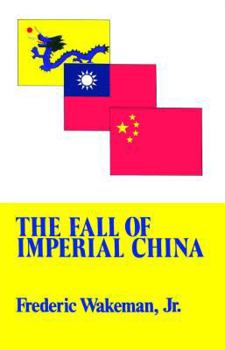The Fall of Imperial China
(Part of the Transformation of Modern China Series)
Select Format
Select Condition 
Book Overview
From Simon & Schuster, The Fall of Imperial China is Frederic Wakeman, Jr.'s exploration of Imperial China--both its astronomic rise and steep decline. From the Introduction: "Historians of modern China are used to contrasting the dizzying changes in post-renaissance Europe with the glacial creep of Confucian civilization. The West's global expansion to new vistas of discovery thus distorts our perspective of those older worlds...
Format:Paperback
Language:English
ISBN:0029336805
ISBN13:9780029336809
Release Date:January 1977
Publisher:Free Press
Length:304 Pages
Weight:0.79 lbs.
Dimensions:0.9" x 5.4" x 8.3"
Customer Reviews
3 ratings
Imperial China in it's most defining hour
Published by Thriftbooks.com User , 20 years ago
This book can be divided into two broad sections. In order to develop a background for his discussion of the Qing dynasty and reasons contributing to its demise, Wakeman, in the first section sketches the major social players of the time: the peasantry, the gentry, and the merchants.The second section, which takes up a majority of the book is concerned with an outline history of the Qing dynasty - from the rise in Manchu power, their conquering of China, their subsequent rule and their ultimate fall. Although the book is brief, only 256 pages (including notes), it is refreshing in its lucid explinations on why the Qing dynasty fell. It places the blame on a combination of internal and external conditions that had been reshaping Chinese society throughout the late 1700's and 1800's.However, most of the book's emphasis is placed on the last sixty years of the dynasty (1850-1910). The bulk of the argument considers the Taiping rebellion(1850-1864) as being the catalyst that set in motion a series of events such as attempts at military, political, economic, and educational reforms, along with the growth in the local gentry. Wakeman considers this growth in gentry power vis-a-vis the central authorities the raison d'e^tre that brought down the Qing dynasty and altered the fundamental traditional relationships within Chinese society.
an excellent survey of Qing dynasty politics
Published by Thriftbooks.com User , 22 years ago
This is an excellent introduction to politics and structural change during the Qing dynasty (1644-1911). In accessible and engaging prose, Wakeman concentrates on how power was organized and what led the most prosperous and perhaps most powerful country in the world to collapse into rebellion and foreign domination before finally breaking apart under warlord rule.Wakeman begins with a useful survey of the class structure of imperial Chinese society: peasants, gentry, merchants, and state. He then briefly describes the rise of the Manchus, their inauguration of the Qing dynasty, and the increasing power of the state under the early emperors. Wakeman devotes the second half of the book to Western imperialism, internal rebellion, and the ultimately futile efforts made by the central government to maintain its control. Woven into this narrative is a description of how the changing institutional basis of the state eventually gave rise to independent local centers of political and military power, dooming the Qing dynasty.If you are looking for a quick, coherent, and well-written survey of Qing politics, this is your book. What the book does not cover is social or (for the most part) economic history. The lives of women and the poor are almost totally absent, and the momentous changes in traditional Chinese culture are rarely explored. While this leaves important gaps in the narrative, Wakeman's approach is far preferable to those textbook writers who seek to include everything but succeed only in sucking the life from their subject. Yet neither does Wakeman stray too far into the realm of personalities: he is able to keep his material lively even while laying out an argument based primarily on structural explanations. This is a service to both the reader and the history.
Brian Wayne Wells, Esquire, reviews The Fall of Imp. China
Published by Thriftbooks.com User , 26 years ago
Frederic Wakeman Jr.'s book, "The Fall of Imperial China" is the first of a series of of books on China which were published in 1974. This series has served as a standard survey text in a number of college undergraduate and graduate level classes on China. "The Fall of Imperial China" will provide some sketchy background on China before the Ch'ing (Manchu) Dynasty (1644-1911), but will deal mainly with with decline of China under the Ch'ing Dynasty. The book carries the story of Chinese history right up to the 1911 Chinese Revolution. Although "The Fall of Imperial China" is a scholarly book, Wakefield's writing style is such that even a person without much education in Chinese history can pick up this book and read it with ease. This is an enjoyable book to have in a personal library because it is so well indexed.






